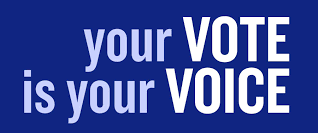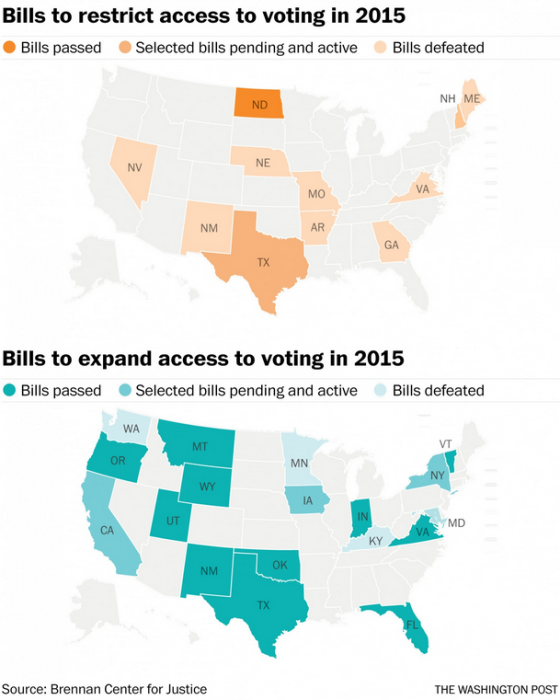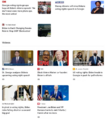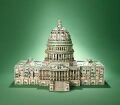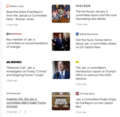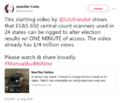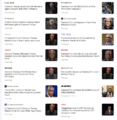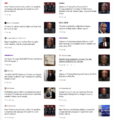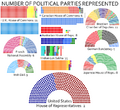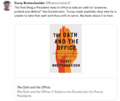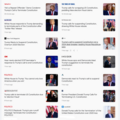Category:Election Law: Difference between revisions
Siterunner (talk | contribs) No edit summary |
Siterunner (talk | contribs) No edit summary |
||
| (4 intermediate revisions by the same user not shown) | |||
| Line 9: | Line 9: | ||
* https://www.amazon.com/gp/bestsellers/books/16023061/ref=pd_zg_hrsr_books | * https://www.amazon.com/gp/bestsellers/books/16023061/ref=pd_zg_hrsr_books | ||
A Sign of the Times: | |||
'''''How to Steal a Presidential Election – February 13, 2024''''' | |||
* https://www.amazon.com/Steal-Presidential-Election-Lawrence-Lessig/dp/0300270798 | |||
“The award for hottest of hot takes goes to Lawrence Lessig and Matthew Seligman [for their book] How to Steal a Presidential Election.” — Scott McLemee, Inside Higher Ed | |||
“Unless we are clear-eyed about the threat of election sabotage we cannot defeat it. This invaluable book provides the roadmap we need to defend our elections.” — Norm Eisen, senior fellow, Brookings Institution | |||
“Warning that America is still vulnerable to another January 6, Lessig and Seligman—two of the nation’s foremost constitutional experts on presidential elections—masterfully reverse engineer and then defuse the constitutional nuclear bomb aimed at the heart of America’s democracy.” — former U.S. Court of Appeals Judge J. Michael Luttig | |||
_ _ _ _ _ _ _ _ _ _ _ _ _ _ _ | |||
| Line 37: | Line 59: | ||
'''''A Letter from | '''''A Letter from theVoting Rights Lab''''' | ||
''In the last few years, the resiliency of American elections has been tested – but it has not broken. From holding a major presidential election during a pandemic, to unlawful and failed attempts to overthrow the will of the voters, to historic numbers of bills being debated to change our election systems, we have witnessed some of the greatest challenges to our democratic institutions and freedom in history. But through it all, voters across the United States remained engaged, showed up to make their voices heard, and successfully defended our democracy.'' | ''In the last few years, the resiliency of American elections has been tested – but it has not broken. From holding a major presidential election during a pandemic, to unlawful and failed attempts to overthrow the will of the voters, to historic numbers of bills being debated to change our election systems, we have witnessed some of the greatest challenges to our democratic institutions and freedom in history. But through it all, voters across the United States remained engaged, showed up to make their voices heard, and successfully defended our democracy.'' | ||
| Line 45: | Line 67: | ||
''The follow report (PDF) is unlike any other we’ve issued before, tracking and analyzing the trends in state-level legislation across the first quarters of 2021, 2022, and 2023 – so we can better understand where we are at this moment in time, right on the heels of the most dynamic period for elections law in recent memory and ahead of another major federal election. | ''The follow report (PDF) is unlike any other we’ve issued before, tracking and analyzing the trends in state-level legislation across the first quarters of 2021, 2022, and 2023 – so we can better understand where we are at this moment in time, right on the heels of the most dynamic period for elections law in recent memory and ahead of another major federal election. | ||
Even though many states are still early in their legislative sessions, our findings are instructive for our collective movement for free and fair elections. Importantly, our research shows that despite what you may hear in the news, the movement for a more accessible and fair democracy is in fact winning, as most of the bills introduced in the last three years actually would improve voting access. In recent years, we’ve seen numerous states adopt state-level voting rights constitutional protections, expand mail and early voting opportunities, restore voting eligibility to individuals with past felony convictions, and break down other barriers to participation in our democracy. We’ve also seen extremely important, lesser noticed reform passed with | Even though many states are still early in their legislative sessions, our findings are instructive for our collective movement for free and fair elections. Importantly, our research shows that despite what you may hear in the news, the movement for a more accessible and fair democracy is in fact winning, as most of the bills introduced in the last three years actually would improve voting access. In recent years, we’ve seen numerous states adopt state-level voting rights constitutional protections, expand mail and early voting opportunities, restore voting eligibility to individuals with past felony convictions, and break down other barriers to participation in our democracy. We’ve also seen extremely important, lesser noticed reform passed with bipartisan support that will have a lasting impact on all voters, such as creating a cure process for fixing minor errors on mail ballot envelopes in nine states, including Texas; allowing in-person early voting for the first time in four states – Missouri, South Carolina, Connecticut, and Kentucky; and giving election officials more time to process mail ballots in 23 states, including Arizona, Florida, Georgia, Michigan, and Ohio.'' | ||
bipartisan support that will have a lasting impact on all voters, such as creating a cure process for fixing minor errors on mail ballot envelopes in nine states, including Texas; | |||
allowing in-person early voting for the first time in four states – Missouri, South Carolina, Connecticut, and Kentucky; and giving election officials more time to process mail ballots | |||
in 23 states, including Arizona, Florida, Georgia, Michigan, and Ohio.'' | |||
'' | ''The report also documents that the number of bills enacted at this point in session related to voting and elections is actually higher than what it was in the first quarter of 2022, meaning state lawmakers are still focused on voting and elections. Indeed, anyone working in the elections policy space will tell you we are as busy as we have ever been.'' | ||
* https://votingrightslab.org/wp-content/uploads/2023/05/VRL-2023_YOYT-Report.pdf | * https://votingrightslab.org/wp-content/uploads/2023/05/VRL-2023_YOYT-Report.pdf | ||
| Line 59: | Line 78: | ||
* https://tracker.votingrightslab.org/ | * https://tracker.votingrightslab.org/ | ||
Highlighting | |||
Highlighting Voter Access - https://tracker.votingrightslab.org/pending/snapshot/access | |||
and Interference with Election Administration - https://tracker.votingrightslab.org/pending/snapshot/interference | and Interference with Election Administration - https://tracker.votingrightslab.org/pending/snapshot/interference | ||
| Line 80: | Line 100: | ||
_ _ _ _ _ _ _ _ _ _ _ _ _ _ _ | _ _ _ _ _ _ _ _ _ _ _ _ _ _ _ | ||
| Line 104: | Line 125: | ||
''The Fair Representation Act would move US House elections into multi-member districts drawn by independent redistricting commissions, and elected through '''ranked choice voting'''. The multi-member districts would be effective in states apportioned six or more seats in the House, and would elect three to five Representatives each, depending on the size of the state. Taken together, these three measures would incentivize congressional candidates to appeal to a broader range of voters.'' | ''The Fair Representation Act would move US House elections into multi-member districts drawn by independent redistricting commissions, and elected through '''ranked choice voting'''. The multi-member districts would be effective in states apportioned six or more seats in the House, and would elect three to five Representatives each, depending on the size of the state. Taken together, these three measures would incentivize congressional candidates to appeal to a broader range of voters.'' | ||
_ _ _ _ _ _ _ _ _ _ _ _ _ _ _ _ _ _ _ _ | _ _ _ _ _ _ _ _ _ _ _ _ _ _ _ _ _ _ _ _ | ||
| Line 122: | Line 145: | ||
* https://www.greenpolicy360.net/w/Oregon_Automatic_Voter_Registration | * https://www.greenpolicy360.net/w/Oregon_Automatic_Voter_Registration | ||
_ _ _ _ _ _ _ _ _ _ _ _ _ _ _ _ _ _ _ _ _ _ _ _ _ _ _ _ _ | _ _ _ _ _ _ _ _ _ _ _ _ _ _ _ _ _ _ _ _ _ _ _ _ _ _ _ _ _ | ||
Latest revision as of 02:25, 15 June 2024
Best Selling Books on Elections (US)
A Sign of the Times:
How to Steal a Presidential Election – February 13, 2024
“The award for hottest of hot takes goes to Lawrence Lessig and Matthew Seligman [for their book] How to Steal a Presidential Election.” — Scott McLemee, Inside Higher Ed
“Unless we are clear-eyed about the threat of election sabotage we cannot defeat it. This invaluable book provides the roadmap we need to defend our elections.” — Norm Eisen, senior fellow, Brookings Institution
“Warning that America is still vulnerable to another January 6, Lessig and Seligman—two of the nation’s foremost constitutional experts on presidential elections—masterfully reverse engineer and then defuse the constitutional nuclear bomb aimed at the heart of America’s democracy.” — former U.S. Court of Appeals Judge J. Michael Luttig
_ _ _ _ _ _ _ _ _ _ _ _ _ _ _
Election Laws in the U.S.
- Fifty States, Variations, Complications
Overview, Begin @Ballotpedia:
Voting Rights
Voting is the foundation of our democracy—the laws governing who can vote and how, when, and where we vote are complex and vary widely from state to state. Issues involve... Voter registration. Mail voting. In-person voting. ID requirements. Proof of citizenship. Voting and criminal justice system (loss of voting rights issues). Voter lists maintenance and removals. Criminal and civil enforcement. Election authority.
Voting Rights Lab
Democracy and the Democratic Republic
Tracking election law and proposed legislation across all 50 states and DC.
A Letter from theVoting Rights Lab
In the last few years, the resiliency of American elections has been tested – but it has not broken. From holding a major presidential election during a pandemic, to unlawful and failed attempts to overthrow the will of the voters, to historic numbers of bills being debated to change our election systems, we have witnessed some of the greatest challenges to our democratic institutions and freedom in history. But through it all, voters across the United States remained engaged, showed up to make their voices heard, and successfully defended our democracy.
Even so, this country has a long way to go to build a democracy that works for all of us, and ensuring every American has the freedom to vote how they choose is core to that mission. That’s why I’m excited to share this new report from Voting Rights Lab with you.
The follow report (PDF) is unlike any other we’ve issued before, tracking and analyzing the trends in state-level legislation across the first quarters of 2021, 2022, and 2023 – so we can better understand where we are at this moment in time, right on the heels of the most dynamic period for elections law in recent memory and ahead of another major federal election. Even though many states are still early in their legislative sessions, our findings are instructive for our collective movement for free and fair elections. Importantly, our research shows that despite what you may hear in the news, the movement for a more accessible and fair democracy is in fact winning, as most of the bills introduced in the last three years actually would improve voting access. In recent years, we’ve seen numerous states adopt state-level voting rights constitutional protections, expand mail and early voting opportunities, restore voting eligibility to individuals with past felony convictions, and break down other barriers to participation in our democracy. We’ve also seen extremely important, lesser noticed reform passed with bipartisan support that will have a lasting impact on all voters, such as creating a cure process for fixing minor errors on mail ballot envelopes in nine states, including Texas; allowing in-person early voting for the first time in four states – Missouri, South Carolina, Connecticut, and Kentucky; and giving election officials more time to process mail ballots in 23 states, including Arizona, Florida, Georgia, Michigan, and Ohio.
The report also documents that the number of bills enacted at this point in session related to voting and elections is actually higher than what it was in the first quarter of 2022, meaning state lawmakers are still focused on voting and elections. Indeed, anyone working in the elections policy space will tell you we are as busy as we have ever been.
In 2023, the Voting Right team is tracking 1,918 bills in 50 states and DC.
Highlighting Voter Access - https://tracker.votingrightslab.org/pending/snapshot/access
and Interference with Election Administration - https://tracker.votingrightslab.org/pending/snapshot/interference
Voter Turnout in the U.S.
Voter Turnout - Expand or Suppress the Vote
_ _ _ _ _ _ _ _ _ _ _ _ _ _ _
"FairVote Reform"
How district's elect the US House of Representatives
June 2017 / Voting Reform Proposed in the US Congress
Did you know that more than 85% of congressional seats are completely safe for one party?
“The Fair Representation Act is the most comprehensive approach to improving congressional elections in American history,” said Rob Richie, the executive director of FairVote. “It creates an impartial, national standard that gets at the core of FairVote’s mission: Giving voters greater choice, a stronger voice, and a representative democracy that works for all Americans.”
The Fair Representation Act would move US House elections into multi-member districts drawn by independent redistricting commissions, and elected through ranked choice voting. The multi-member districts would be effective in states apportioned six or more seats in the House, and would elect three to five Representatives each, depending on the size of the state. Taken together, these three measures would incentivize congressional candidates to appeal to a broader range of voters.
_ _ _ _ _ _ _ _ _ _ _ _ _ _ _ _ _ _ _ _
Model Voter Registration Law: Expand the Vote, Expand Democratic Participation
Oregon is first-in-the-nation with a prototype for... automatic registration...
The "motor voter" bill: An ebullient Governor Brown called it a "unique and humbling opportunity" when she signed House Bill 2177 on March 16 -- creating a first-in-the-nation system that automatically registers Oregon voters (with an opt-out window) by drawing data from their driver's license records.
Model Legislation for Your State:
OREGON 78th LEGISLATIVE ASSEMBLY--2015 House Bill 2177
_ _ _ _ _ _ _ _ _ _ _ _ _ _ _ _ _ _ _ _ _ _ _ _ _ _ _ _ _
Oregon Automatic Voter Registration / March 2015
○
- "There’s absolutely no good reason for such proposals not to be adopted — and not just state-by-state, either. There’s no good reason for the burden of voter registration to be on the voter, instead of on the government."
- "Indeed, the United States is unusual in making it hard by requiring a two-step process for eligible voters — that is, registering and then voting. Most world democracies have automatic registration."
_ _ _ _ _ _ _ _ _ _ _ _ _ _ _ _ _ _ _ _ _ _ _ _ _ _ _ _ _ _ _ _ _ _ _ _ _ _
June 2015
"Everyone, every young man or young woman, in every state in the union should be automatically registered to vote when they turn 18—unless they actively choose to opt out. But I believe this would have a profound impact on our elections and our democracy. Between a quarter and a third of all eligible Americans remain unregistered and therefore unable to vote."
_ _ _ _ _ _ _ _ _ _ _ _ _ _ _ _ _ _ _ _ _ _ _ _ _ _ _ _ _ _ _ _ _ _ _ _ _ _
Additional Voting Resources via GreenPolicy:
○
Subcategories
This category has the following 21 subcategories, out of 21 total.
B
C
D
E
G
I
M
P
R
U
V
W
Pages in category "Election Law"
The following 14 pages are in this category, out of 14 total.
Media in category "Election Law"
The following 81 files are in this category, out of 81 total.
- 33 false statements.png 640 × 91; 19 KB
- Access to Voting US-2015.png 560 × 700; 316 KB
- American Legislative Exchange Council.jpg 646 × 143; 41 KB
- AP-NORC poll on Democracy Election.jpg 600 × 752; 208 KB
- At Poynter, St Petersburg, Florida.png 640 × 345; 555 KB
- Biden - will we choose democracy.png 448 × 168; 30 KB
- Biden delivers voting rights speech in Atlanta.png 600 × 679; 387 KB
- Biden voting rights speech attacked by McConnell.png 600 × 321; 142 KB
- Biden voting rights support fading.png 600 × 682; 386 KB
- Cassidy Hutchinson testifies at Congressional committee hearing.png 640 × 447; 200 KB
- Confronting the Presidents.jpg 291 × 446; 59 KB
- Democracy Challenged, Democracy Awakening.png 578 × 800; 420 KB
- Democracy Docket - June 2023.png 559 × 480; 383 KB
- Donald Trump criminally charged in Miami, Florida - CNN.png 640 × 518; 589 KB
- EleanorRooseveltHumanRights.png 535 × 423; 60 KB
- ElectionResources.png 607 × 243; 141 KB
- Electoral Count Reform Act - US, Brennan Center 2023.png 749 × 1,611; 339 KB
- Electoral Reform US FairVote.jpg 662 × 270; 36 KB
- FairVote.jpg 535 × 122; 14 KB
- Ginsburg leaves a chasm on the Supreme Court.jpg 800 × 624; 92 KB
- Gov and money.jpg 240 × 210; 7 KB
- GP360 tagcloud2.png 655 × 400; 184 KB
- Hannah Arendt warns us.jpg 475 × 236; 20 KB
- Hannah Arendt.jpg 527 × 680; 51 KB
- How to Fact Check.png 600 × 766; 384 KB
- I voted.jpg 600 × 800; 118 KB
- Jan. 6 final report - news 1.png 600 × 693; 280 KB
- Jan. 6 final report - news 2.png 600 × 584; 260 KB
- January 6 committee - on December 19 2022.png 640 × 468; 591 KB
- January 6 committee final hearing - news.png 600 × 661; 343 KB
- January 6 committee votes to issue criminal referrals against Trump.png 800 × 204; 458 KB
- June 28 2022.png 800 × 565; 300 KB
- Liberty Bell.jpeg 425 × 640; 129 KB
- Living Democracy.png 787 × 600; 867 KB
- Manual Audits needed.png 557 × 480; 148 KB
- Methods of Nonviolent Action.pdf ; 49 KB
- Monarch Bay Hotel 1.jpg 700 × 495; 115 KB
- Money in Politics - PoliticoPay.png 491 × 226; 31 KB
- Money in Politics-System Failure-JLawrence Vid 2019.jpg 496 × 501; 44 KB
- Moore v Harper - attorneys.png 480 × 504; 156 KB
- No way nuclear codes being handed back to him.png 494 × 800; 106 KB
- OhClarence - Google News - Aug 10, 2023.png 800 × 856; 391 KB
- OhClarence 2 - Google News - Aug 10, 2023.png 800 × 819; 461 KB
- OhClarence 3 - Google News - Aug 10, 2023.png 800 × 842; 473 KB
- OhClarence 4- Google News - Aug 10, 2023.png 800 × 853; 491 KB
- One year later...I will defend this nation Jan-6-2022.png 513 × 364; 238 KB
- Point of View of the Acceptance Speech.png 600 × 771; 687 KB
- Political parties represented 2015.png 720 × 658; 441 KB
- President Biden - January 5, 2024.png 600 × 470; 236 KB
- President Biden speaks of protecting democracy - Jan 5 2024.png 600 × 686; 214 KB
- President Biden speaks of protecting democracy - News on Jan 5 2024.png 600 × 664; 351 KB
- Project 2025 - Russell Vought and Donald Trump (AP).png 600 × 631; 453 KB
- Protect Democracy.png 775 × 600; 727 KB
- RBG as mom.jpg 320 × 320; 11 KB
- RBG as student.jpg 480 × 600; 27 KB
- RBG at Harvard Law School.jpg 640 × 942; 42 KB
- Re US 2020 pres campaign news-about-accepting-election-results.jpg 700 × 1,343; 300 KB
- Richard Jacobs and The Man in the Arena - on July 4 2022.png 800 × 380; 192 KB
- Rise of Partisanship in US Congress.png 800 × 437; 178 KB
- Roosevelt and Muir at Yosemite.png 503 × 694; 686 KB
- SCOTUS-and the curtain re ABA.jpg 800 × 401; 152 KB
- Stopping the Steal, HBO documentary Sept 2024.png 600 × 683; 246 KB
- Summit for Democracy.png 800 × 252; 221 KB
- SunlightFoundation-logo.png 198 × 70; 10 KB
- Surviving Victory - Liberty at Risk.jpg 448 × 433; 63 KB
- The Great Hack.jpg 640 × 395; 73 KB
- The Oath and the Office.png 572 × 480; 151 KB
- Totalitarianism in the Age of Trump, Lessons from Hannah Arendt.png 638 × 644; 143 KB
- Trump on Termination of US Constitution - 1.jpg 600 × 607; 166 KB
- Trump on Termination of US Constitution - 2.jpg 600 × 600; 181 KB
- Trump on Termination of US Constitution - 3.PNG 600 × 600; 227 KB
- Trump opposing fact checking.jpeg 640 × 199; 24 KB
- Trump's campaign against facts & fact checking.jpeg 640 × 247; 41 KB
- US Party Identification 88 to 14.jpg 494 × 314; 27 KB
- US Senate debates voting rights bill.jpg 640 × 461; 107 KB
- Virality, social media networking.png 640 × 406; 181 KB
- Voting restriction bills 3-24-2021.png 640 × 409; 78 KB
- When-money-talks cressman-book-jacket.png 184 × 293; 97 KB
- Your vote.png 318 × 133; 11 KB
- Legislation
- Topic
- Ballot Access
- Ballot Initiatives
- Ballot Measures
- Campaign Finance
- Civil Rights
- Climate Policy
- Corporate Accountability
- Democracy
- Election System Reform
- Electoral System Reform
- Environmental Laws
- EOS eco Operating System
- Green Politics
- Green Values
- Human Rights
- Initiative and Referendum
- Initiatives
- Money in Politics
- Participatory Governance
- Planet Citizen
- Redistricting
- Sustainability Policies
- United States
- US
- Voting
- Voting Rights
- Voting Systems
- Workers Rights

